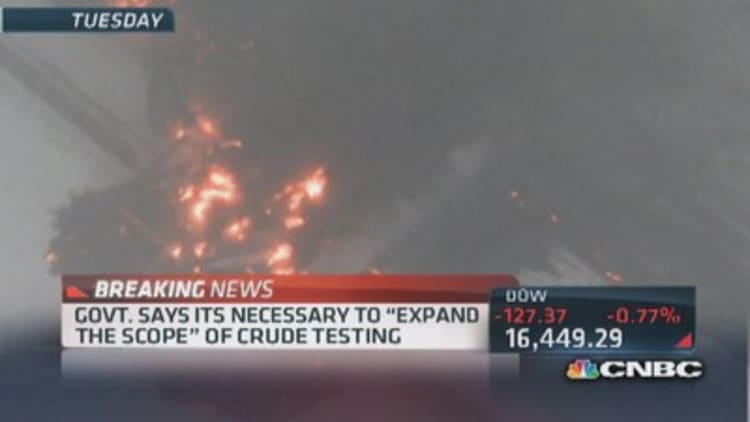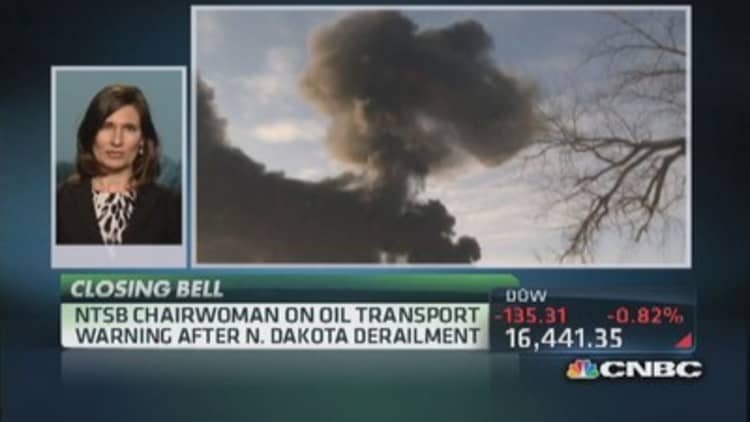
Following this week's fiery train crash in North Dakota, federal regulators on Thursday issued a safety alert that crude oil being transported from the Bakken region, which stretches through swaths of North Dakota and Montana, may be more flammable than traditional heavy crude.
The Pipeline and Hazardous Materials Safety Administration said it issued the alert to notify the public, emergency responders, shippers and carriers as a result of its preliminary inspections after recent train derailments and resulting fires in North Dakota, Alabama and Canada.
(Read more: Train collision forces N. Dakota town evacuation)
The most serious of these derailments was in Lac-Megantic, Quebec, where last July a runaway train speeded for seven miles into the town and crashed into a nightclub, killing dozens. Part of the Department of Transportation, the PHMSA said it is reinforcing the requirement that hazardous materials be properly tested, characterized, classified and where necessary, degasified.
About 700,000 barrels per day of Bakken crude is carried by rail—a fast-growing, flexible alternative to pipelines for transporting the landlocked oil to the Gulf Coast and East and West Coast refineries. A total 900,000 barrels a day of crude moved by rail in North America during the third quarter, according to IHS.
The hazards of rail shipping are expected to give more weight to the argument for pipelines, including the controversial Keystone XL pipeline, under review by the State Department. That pipeline would carry crude from the Canadian sands to a southern extension that would bring it into the Gulf Coast refining region.
The pipeline agency, along with the Federal Railroad Administration, said that as part of its investigation of the accidents it has begun a compliance initiative involving unannounced inspections and testing of crude shipments to verify that they have been properly classified.
"The flammability and combustibility of these rail car accidents I think has caught [rail] industry people by surprise," said Christian Weatherbee, rail analyst at Citigroup.
The most recent incident occurred when a BNSF Railway train carrying soybeans derailed Monday and a portion fell onto a neighboring track in front of the approaching oil train. Eighteen of the 106 cars on the oil train derailed; several burned, causing a massive plume and explosions. The 2,400 residents of nearby Casselton, N.D., were temporarily evacuated.

The National Transportation Safety Board had said the BNSF train was carrying materials classified as a flammable liquid. An NTSB official explained that the crude was packing group No. 1, which has the lowest flash point of three government-determined groups for hazardous materials.
Materials in packing group No. 1 have a boiling point of less than 95 degrees Fahrenheit, and that could mean they pose a more serious fire risk if they escape a container in an accident, according to the pipeline agency. The agency also said that it expects to have final test results in the near future for the gas content, corrosivity, toxicity, flammability and other characteristics of Bakken crude oil, which should help determine the proper characterization of the material.
NTSB board member Robert Sumwalt, leading its investigation, said earlier in the week that the rail cars involved in the crash were older types that do not meet the latest industry safety standards, effective since 2011. The agency has said that 69 percent of tank cars were built before 2011, and the industry has estimated a $1 billion price tag to retrofit them. Some of the changes would be adding extra jackets to tanks or stronger steel at the head.
NTSB Chairwoman Deborah Hersman said that the agency has been pushing for retrofitting of cars and that active rulemaking is underway at DOT concerning rail car safety.
"Those tank cars are the last line of defense," Hersman said on "Closing Bell." "They need to be robust enough to contain that product and not result in a chain reaction event like we saw in North Dakota."
In addition to retrofitting of older cars, she said, new cars must be built more safely.
Berkshire Hathaway owns BNSF. In a statement, the company said, "We are cooperating fully with the NTSB and want to learn all that we can from the investigation to drive even more safety improvements."
BNSF said the rail industry has reduced rail accidents, grade crossing collisions and employee injuries by 80 percent or more since 1980, according to the Federal Railroad Administration. It said 2012 was the safest year in rail history, and in 2013 BNSF improved safety numbers below the record set in 2012.
BNSF has said it would support a plan to phase out older cars over seven years, allowing the industry time to build replacements. Former BNSF CEO Matt Rose made that comment in an interview with Reuters last November.
"There's no legal mandate binding anybody to upgrade the cars," Weatherbee said. "There are newer cars and when you look at the order book for new cars coming online, most of them meet higher standards. The rail industry owns few if any of these cars. These are owned by the customers. This would not be a cost borne by the rail industry, it would be a cost borne by shippers."
Retrofitting would add to the costs of rail shipping of crude, according to Weatherbee.
"It would change the economics potentially for crude by rail. You've got to go by the economics—why do people move crude by rail?" he said. "In some cases, it may be cheaper than a pipeline, or a pipeline is nonexistent."
—By CNBC's Patti Domm. Follow here on Twitter @pattidomm.


